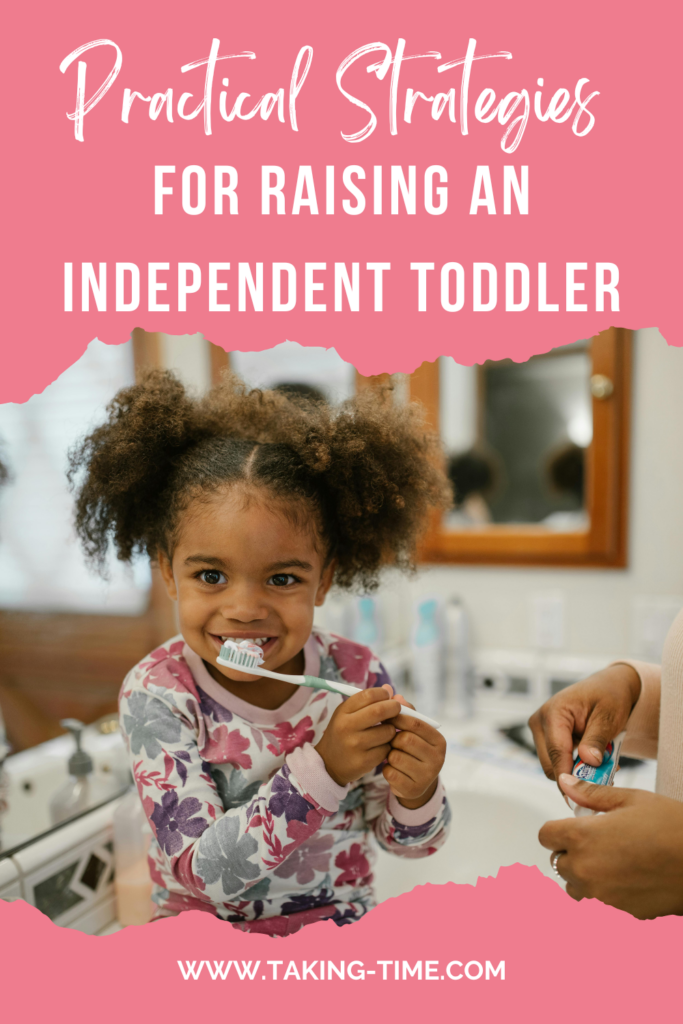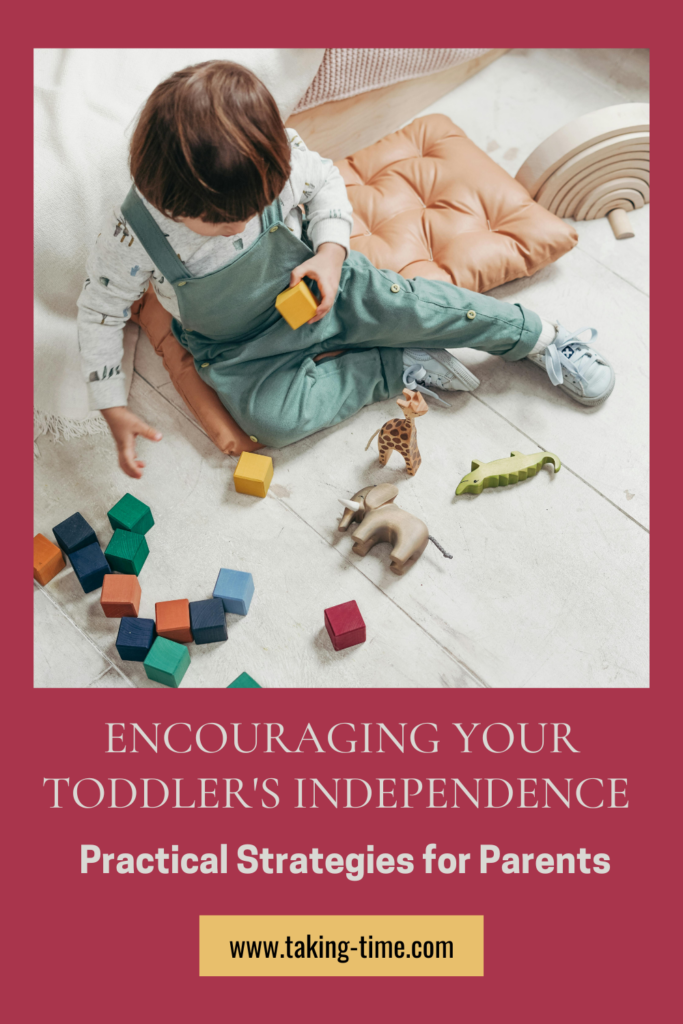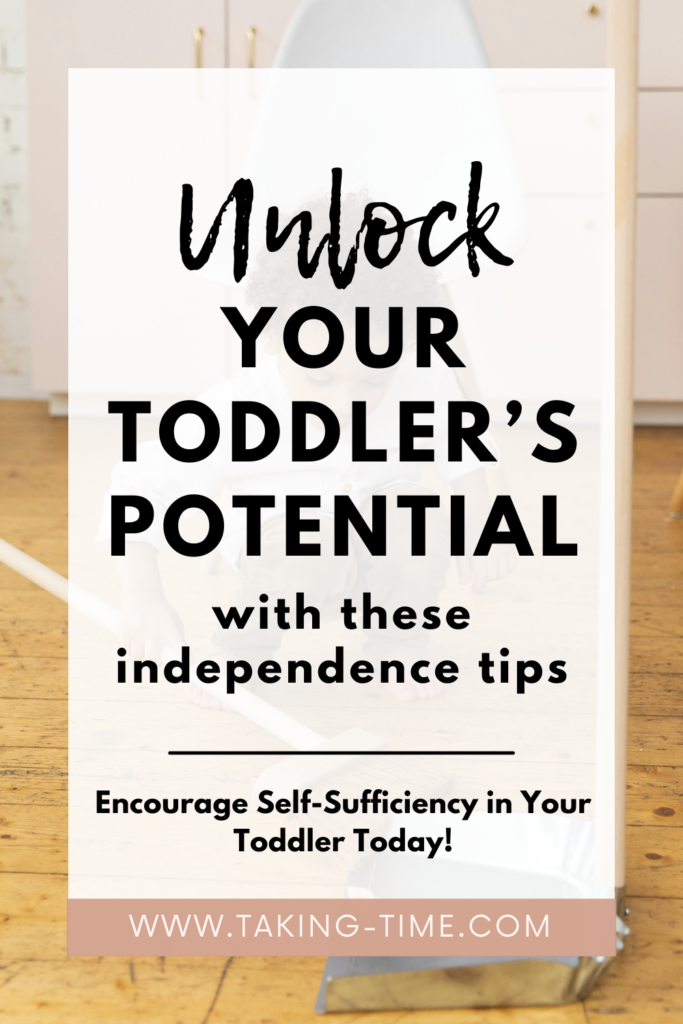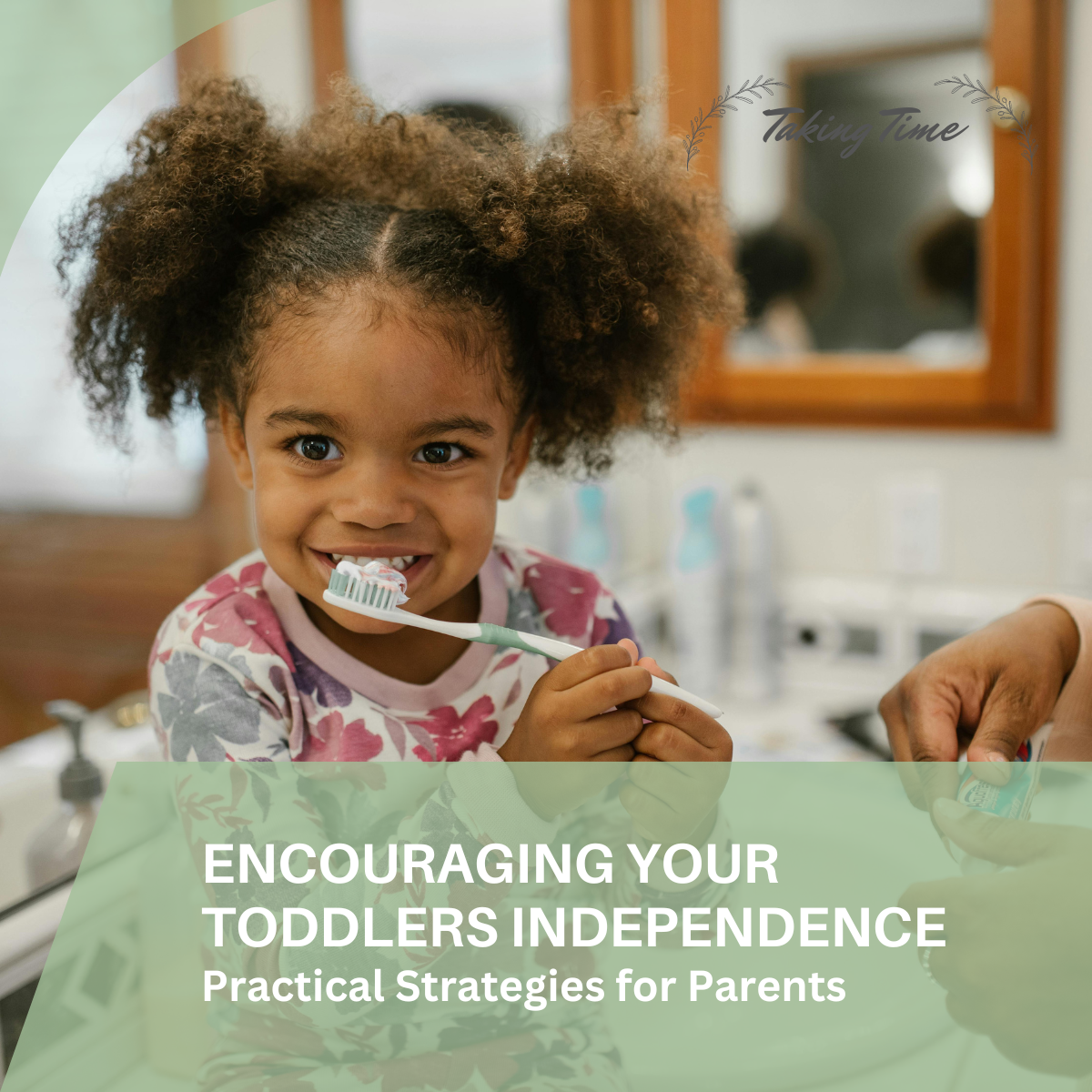Parenting a toddler can be both challenging and rewarding, especially when you see your little one striving to do things on their own. Encouraging your toddler’s independence is a crucial part of their development, helping them build confidence, skills, and a sense of accomplishment. In this blog post, we’ll explore practical strategies for fostering toddler independence, making your life a bit easier while raising a happy, self-reliant child.
This post may contain affiliate links, which means I’ll receive a commission if you purchase through my links, at no extra cost to you. Please read full disclosure for more information.

Why Encourage Your Toddler’s Independence?
Encouraging independence in your toddler has numerous benefits. A more capable and independent toddler means they can do more for themselves, freeing up some time for you. When they’re not constantly asking for help, you can focus on other tasks, knowing they’re developing essential life skills.
An independent toddler is often a happier toddler. They experience fewer tantrums because they feel a sense of control and accomplishment. Additionally, toddlers love to help. When you involve them in daily tasks, they feel important and valued.
When to Start?
You can start encouraging independence as early as age 1. Around 14-15 months, you’ll likely notice your toddler showing eagerness to help with tasks and do things independently. However, any time between ages 1 and 3 is ideal for building these skills. Every child is different, so observe their behavior and take cues from them to determine the best time to start.
What to Look For
Desire to Do Things Themselves
- Reaching for Utensils: They want to feed themselves.
- Dressing Themselves: Insisting on putting on their clothes, even if they struggle.
- Brushing Teeth or Hair: Trying to perform these tasks on their own.
Exploration and Curiosity
- Wandering Away: Exploring their surroundings independently.
- Opening Cabinets and Drawers: Investigating what’s inside.
- Interest in New Objects: Wanting to manipulate new items by themselves.
Refusal of Help
- Saying “No”: Rejecting assistance.
- Pushing Away Help: Displaying frustration when you try to help with a task.
Imitating Adult Behavior
- Copying Actions: Mimicking cooking, cleaning, or using tools.
- Playing with Pretend Toys: Using toys that mimic adult activities, like cooking sets or toolkits.
Choosing Their Own Clothes or Toys
- Strong Preferences: Expressing what they like or dislike.
- Selecting Outfits or Books: Choosing what they want to wear or read.
Expressing Opinions and Making Decisions
- Verbal Preferences: Clearly stating their likes and dislikes.
- Making Choices: Deciding what they want to eat, play with, or wear.
Problem-Solving Attempts
- Figuring Out Mechanisms: Trying to understand how puzzles, locks, or simple devices work.
- Persistence: Continuing to try completing a task on their own.
Independently Following Routines
- Following Daily Routines: Washing hands or brushing teeth without being prompted.
- Bedtime Independence: Going to bed or getting up on their own.
Playing Independently
- Solo Play: Engaging in activities alone for extended periods.
- Creating Games: Inventing their own games and activities without seeking constant interaction.

How to Foster Independence in Toddlers
Provide Independent Play Time
Allowing your toddler time to play without interruptions is crucial. Sometimes, even casual comments like “Wow, I like your drawing. Is that a pony?” can break their focus. Create a “yes space” that is safe and accessible for them to explore. Keep the play area tidy and organized; toddlers are more likely to engage in independent play when toys are presented neatly rather than piled in a toy box.
Encourage Them to Do Tasks Themselves
Encourage your toddler to brush their teeth, put on shoes, complete simple puzzles, and wash their hands on their own. Involve them in household chores like unloading dishes, doing laundry, and wiping the table. They might not do these tasks perfectly, and you may need to redo them, but the involvement makes them feel important and capable.
Creating an environment where your toddler can easily access and use items independently is key to fostering self-sufficiency. Here’s how you can adjust different areas of your home to support your toddler’s independence:
Furniture
- Floor Bed: A floor bed allows your toddler to get in and out of bed by themselves. This promotes autonomy in sleep routines and reduces the need for your assistance. You don’t necessarily need to buy something fancy. It can be as simple as putting their crib mattress on the floor.
- Weaning Table: Small tables and chairs designed for toddlers provide a place where they can eat, play, or do activities independently. Ensure the furniture is sturdy and the right size for your child. Again, you can DIY this with things from thrift stores or around your house.
- Low Clothing Rack: Install a low clothing rack in their room or closet so they can choose and put away their clothes. This not only promotes independence but also helps them learn to dress themselves.
- Learning Tower: A learning tower is a sturdy platform that allows your toddler to safely reach kitchen counters or sinks. It enables them to participate in cooking, washing dishes, or other activities that require a higher surface. This tool fosters independence and includes them in daily household tasks.
Self-Care
- Mirror at Their Level: Mount a mirror at your toddler’s height in the bathroom or their bedroom. This allows them to see themselves while brushing their teeth, combing their hair, or washing their face.
- Functional Sink: Consider installing a step stool or a faucet extender to help them reach the sink. This makes washing hands and brushing teeth more manageable. If they have a play kitchen, you can replace the faucet with a water pump to create a functional version.
- Hand Towel: Place a hand towel at a lower level where they can easily reach it. This encourages them to dry their hands after washing without needing assistance.
- Shoe Horn: A small shoe horn can help them put on their shoes independently. Keep it accessible and show them how to use it.
Eating
- Mini Fridge: If possible, a mini fridge stocked with healthy snacks at their level can give them the autonomy to choose and access their own food. Make sure the snacks are toddler-friendly and easy to handle.
- Lower Cabinet for Dishes: Designate a lower cabinet for storing their dishes, cups, and utensils. This setup allows them to set the table or grab a snack without needing help.
- Snack Station: Create a snack station with pre-portioned snacks in accessible containers. This enables them to serve themselves when they’re hungry.
Cleaning
- Hand Broom: Provide a small hand broom and dustpan that they can use to clean up small messes. Demonstrate how to use these tools and encourage them to clean up after themselves.
- Rags or Wipes: Keep a supply of rags or wipes in an accessible location for them to use when they spill something or need to wipe a surface. Show them how to use and dispose of the wipes properly.
- Child-Sized Cleaning Tools: Invest in child-sized versions of cleaning tools, such as mops, brooms, and dusters. These tools are easier for small hands to manage and make cleaning tasks more fun. Before buying brand new, you can look at what you already have and determine if they can be modified for small frames. I often shorten my extendable duster for a makeshift broom for my son.

Provide Opportunities to Practice Fine Motor Skills
Offer activities that help develop fine motor skills, such as pouring, scooping, threading, zipping, and flipping switches. These tasks not only build independence but also improve their dexterity and coordination.
Offer Choices
Giving your toddler choices fosters a sense of control. Narrow down the options to avoid overwhelming them and ensure the choices are acceptable to you. For example, let them pick between two or three preselected outfits, decide if they want bubbles or no bubbles for bath time, or choose between a banana or grapes for a snack.
Don’t Rush
Understand that tasks will take longer when your toddler is doing them independently. Plan accordingly and be patient. The extra time spent now will pay off as they become more self-sufficient.
They Are Still Toddlers
Remember, your toddler still needs nurturing and support. Sometimes they will want to be babied, cuddled, and played with. It’s okay to provide this comfort so they don’t feel pressured to be independent all the time. Observe their cues to know when to step in and when to step back.
Key Takeaways
Encouraging your toddler’s independence requires patience, observation, and a willingness to let them try things on their own. By providing opportunities for independent play, involving them in household tasks, making their environment accessible, and offering choices, you can help them build confidence and skills. Remember, they are still toddlers and will need your support and comfort along the way. You’ll be amazed at how much they can do and how much happier they’ll be with some control and self-sufficiency in their lives.
By fostering independence in your toddler, you’re not only helping them grow into capable and confident individuals but also making your parenting journey more rewarding and enjoyable. Embrace the process, celebrate their achievements, and watch them thrive.
We hope you found these strategies for fostering your toddler’s independence helpful! Every child is unique, and we’d love to hear about your experiences. Have you tried any of these tips? Do you have any additional suggestions or questions? Please share your thoughts and stories in the comments below. Your feedback and insights not only enrich our community but also help other parents on their journey. Let’s support each other in raising confident and independent toddlers!

You really make it seem so easy with your presentation however I in finding this topic to be actually something that I believe I would never understand.
It kind of feels too complex and extremely vast for me.
I’m taking a look forward in your subsequent post, I’ll attempt to get the
hold of it!
Getting children on the path to independence creates confident and healthy adults. Lots of good advice and tips in your article.
This is such an insightful and encouraging post! Fostering independence in toddlers is indeed a rewarding journey that requires patience and support. I love the practical tips you’ve shared, like involving them in household tasks and making their environment accessible.
So much great advice here, thank you!
I love this so much. If only I had seen this post when my daughter was a toddler 🙂 Thank you for sharing!
Independence is so important at this age! Thanks so much for the reminder… it’s so hard for me to slow down and wait and give my toddlers time!